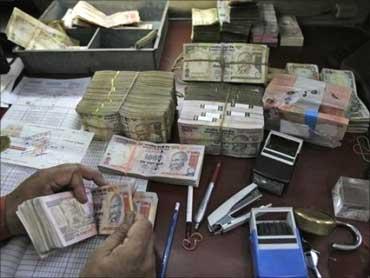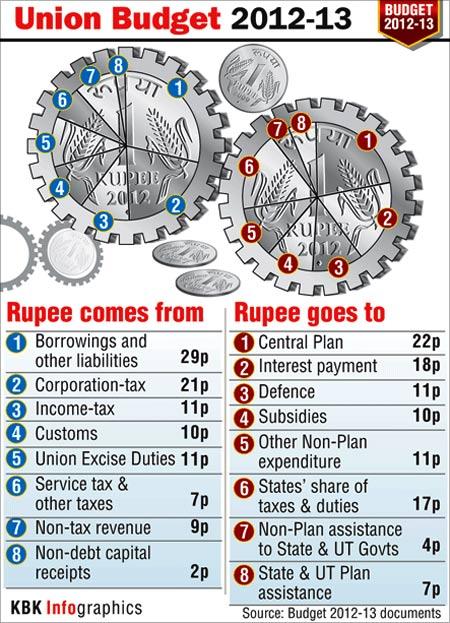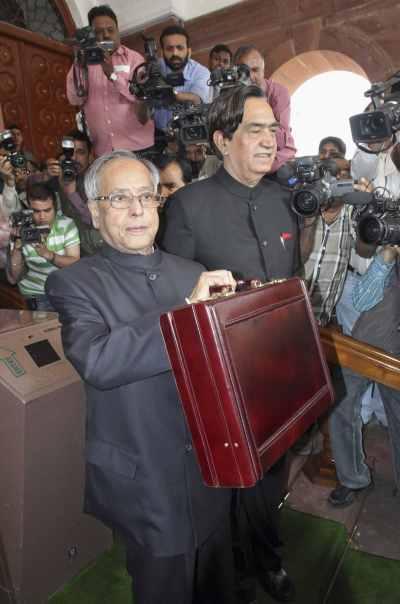Please Share:: 
India Equity Research Reports, IPO and Stock News
Visit http://indiaer.blogspot.com/ for complete details �� ��
The Union budget is probably the most hyped-up economic event which has transcended the humble profit and loss account of the government to one which has virtually all policy ingredients for the country enmeshed in it.
This has been a post-reforms phenomenon wherein the finance ministry is also expected to give indications on what the Reserve Bank, the ministry of agriculture, ministry of petroleum, ministry of disinvestment, ministry of commerce, etc, have to do as a follow up to what the budget predicates.
Agencies
Given a plethora of expectations from the middle class and demands from industry, and the constant vigil of economists, critics and opposition parties, getting numbers that make everyone happy is close to impossible. The government cannot possibly lower all tax rates and spend lots on projects and also protect the poor and still have a nice cozy deficit.
Therefore, when we have to judge the budget and its effectiveness we need to look at it from the economic implications point of view. To understand this, we can pose 10 questions. If most are in the affirmative, then the budget has delivered; if not, then a neutral stance can be taken as budgets anyway do not have the power to transform the entire economy.
First, are the budgetary numbers realistic? Given the fallout of what happened last year, we need to look at the underlying growth assumed for the year as this decides whether revenue collections will be on target. The 5.1 percent fiscal deficit is based on certain assumptions of a recovery in economic growth, disinvestment taking off and some rationalisation and capping of subsides. These appear to be fairly reasonable assumptions to make at the beginning of the year, though we would have liked the budget to talk more on how we are planning to lower the fuel and fertiliser subsidies. Therefore, a positive stance can be taken here.
Second, does the budget do anything to inspire growth? There are some elements in the budget which talk of growth indirectly in terms of providing incentives to infrastructure and savings. But otherwise, growth inducing measures, such as, say, an investment allowance, which would have inspired growth, is missing here. In fact, the budget depends on growth to make it work. A neutral answer here.
Third, what is the impact on inflation? The budget has raised the excise, customs and service tax rates in general. Overall tax collections from excise, customs and service tax are to increase, which will have a bearing on the price level. Though this would be product-specific, the general impact on inflation will be in the upward direction, especially if we add the inflation being caused by the recent freight increases. This one is a negative.
Fourth, does the budget touch upon savings and investment? There are actually no direct measures to increase savings, though there are some feeble attempts at encouraging savings in equity. Quit clearly, after giving away something in income tax concessions, the government has been cautious in widening this basket of tax savings schemes. In terms of investment, the budget certainly has directed attention on infrastructure for growth. There is an increase in its own capital expenditure through the plan allocations, which will help. Here it is marginally positive.
Fifth, does the fiscal deficit number look ominous in terms of creating problems for the private sector? In FY12, the borrowing of the central government overshot by almost Rs 1 lakh crore. The present number of Rs 5.7 lakh crore is large and any slippage here will pressure the system even more. There is no clear answer really because a lot will depend on whether the economy grows rapidly, necessitating greater demand for credit. In FY12, while growth in deposits was tardy, funds were channelled mostly to government paper.
Further, with the private sector also claiming funds as credit the pressure on liquidity will increase. Add to this the thought of disinvestment not taking off fully, and the pressure on liquidity would become more distinct. Therefore, this factor will be marginally negative assuming targets are met.
Sixth, has the budget made provisions to revitalise agriculture? Here, it must be remembered that the farm sector is one where we need to invest continuously to bring about a turnaround and the budgets in the past five years or so have taken on this challenge quite well. While it may be argued that small amounts may not matter, given the limitations on resources, the budget appears to have done okay on this score. This time, ostensibly due to rationing of funds, the benefits have been indirect through the credit channel of higher credit flows and interest rate subvention. This is a positive.
Seventh, does the budget help in increasing consumption, given that one of the reasons for slower industrial growth has been lower demand? The answer here is the concessions given on the income tax front need to be balanced with high inflation observed over the last two years, which cumulatively has shaved off around 15-20 percent of purchasing power. The income tax concessions are commendable, though one would have been happier with a larger benefit. The inflation impact of the other budget proposals are still unknown, and could compensate for this gain. Therefore, there’s a marginally positive sign here.
Eight, does the budget have anything to offer to industry in a positive manner? A difficult evaluation really given that industry is not a homogenous entity and is broad. There are no corporate tax benefits. There are benefits on ECBs, venture capital funds, repatriation of dividend, research and development, SMEs and so on. Nothing great, but positive nonetheless.
Nine, has the budget been kind to the capital market? The capital market is idiosyncratic and one can never be sure of what takes it up. The immediate reaction was positive, though the Sensex ended downwards. The securities transaction tax (STT) has been reduced for delivery-based transactions, which is mildly positive for the market. The new scheme for equity for people earning less than Rs 10 lakh will help small investors. It could have been more enchanting if corporates got more direct benefits like, say, investment allowance. But, the impact is still positive.
Last, has the budget shown any proclivity to reforms? This is tricky issue, given the developments that have been taking place. It steers clear of controversy and touches on GST, DTC and FDI in retail while also elaborating on an array of bills that are waiting for debate in the Parliament. A negative for his one.
Based on all these parameters, there are six in the positive zone, three in the negative area while one neutral. Therefore, on the whole a fairly modest and realistic budget which is conservative with numbers but still treads a slippery ground on its assumptions on growth, subsidies and disinvestment which can upset the proverbial budget cart.
Madan Sabnavis is Chief Economist, Care ratings. The views are personal
 India Equity Research Reports, IPO and Stock News
India Equity Research Reports, IPO and Stock News



